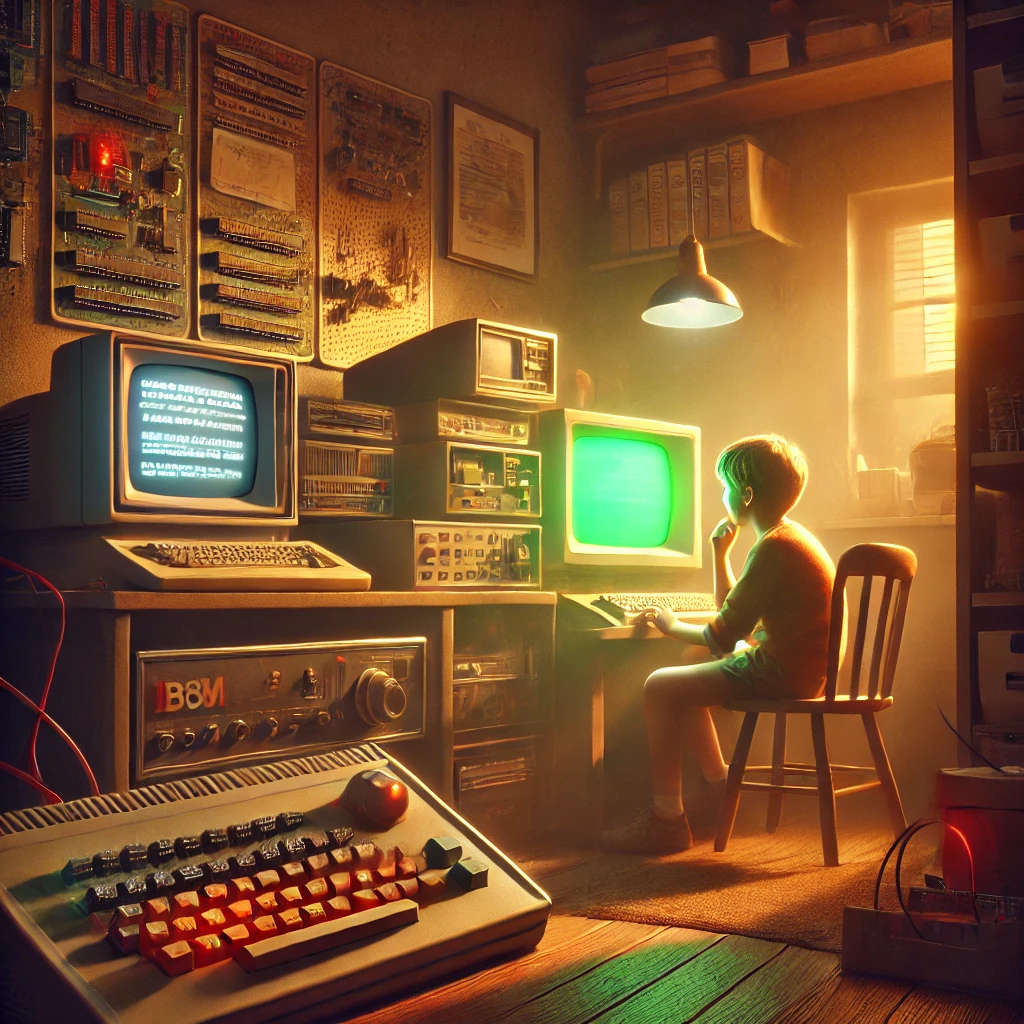A Personal Journey Through Computing’s Golden Age
There’s something extraordinary about the way computers used to be—when they were more of an enigma than a household item. I was just 11 when I first encountered a computer, a TRS-80, in intermediate school (junior high?) I can still remember the curious excitement that thing sparked in me. Up until then I was into electronics, which was cool but obtaining components was difficult or expensive, not to mention multimeters and oscilloscopes and burning Mums carpet with a fallen soldering iron! With this computer, everything was already there to explore an endless world of possibility. Each new project no longer required acquisition of hard to come by physical components. I could type “new” and write different code! The machine ran BASIC, and each line I typed opened a new door of discovery. For a kid with a big imagination and a mind that wanted to understand every detail, it was the closest thing to magic.

Growing up in a small town without the internet, I was alone in my fascination. No one else I knew was drawn to computers, and for a while, it seemed like I was in a world of my own. We couldn’t afford a computer at home, but with access to the local polytechnic library and a donated bicycle, I managed to learn enough to tinker with a Zilog Z80 CPU and make it flash an LED. I still remember building a home-brew EPROM programmer to do it. In a world where other kids were just discovering video games, I was piecing together the bits of a computer from scratch.
Eventually, I got my hands on a Sinclair ZX-81, and later a ZX Spectrum. These machines opened more doors, with each one feeling like an achievement as I saved up for parts, slowly putting it all together. By the time I finally had access to a Commodore 64 and later a C-128 I could call my own, I was still two or three years behind the kids at school, but every little bit of progress felt hard-earned and meant a lot.
The biggest leap came when my dad took out a hefty loan so we could buy our first IBM-compatible 286 computer. We couldn’t afford much—a green EGA monitor and a 20MB hard disk (not GB!) had to do. The total cost? A whopping $4,500 in 1987. Back then, the cost and commitment felt monumental, but so did having the machine in front of me. And while we skipped the colour monitor and sound cards—“Real computers don’t play music,” I was told—it didn’t matter. In that clickety-clack whir of that shiny new wonder, I heard possibility.
On that IBM 286 (compatible) I discovered Pascal. Turbo Pascal for DOS was the gateway, and later, when Windows came along, Borland’s Delphi (Pascal based) became my tool of choice. For the first time, I felt fluent in a language that spoke back to me with clarity. This structured, logical language allowed all the pieces I’d been trying to fit in my mind to come together with out the dreaded, “out of memory” issues of the old BASIC interpreter.
Then, all of a sudden, the World Wide Web arrived. With it came a flood of new programming languages. We had Java, JavaScript, Tomcat and even some weird crap from Microsoft nobody wanted. (I jest! Sort of.) I held on to Pascal running disconnected, locally for a while but eventually joined the web development wave. The transition was strange—trading carefully structured, highly efficient and powerful code for the constant novelty of new frameworks and libraries. In the early days of the World Wide Web it seems like we’d taken a great step backwards. We had powerful computers but now everything had to run in these crappy, slow browsers with severely limited, bug ridden programming languages. Nevertheless, I had always dreamed of a world of connected computers bringing people together and suddenly, here it was! For the first time, I felt my bent for computer programming was part of something much larger.
Today, with languages like C++, Swift, Go, Rust, modern Ada and others making efficiency cool again, I feel a bit of that original magic returning—a full circle, in a way. Looking back, each computer, every bit of code, was more than a machine; it was a piece of myself I was figuring out, a step forward in a journey I was taking alone, for the most part. My high-functioning autistic mind loved the focus and logic of it all, finding patterns where others only saw complexity. Still does.
In those days, very few seemed to share my excitement. But I’ve since come to understand that many of us felt like lone explorers, finding magic where others saw only wires. We just didn’t know each other existed because, well, no Internet! So, if you’re reading this—maybe a bit like I was back then, feeling alone in a passion only you understand—I hope you feel that spark, that thrill of possibility. The world may have changed, but that magic? It’s still out there, more than ever. What’s that you say? AI? Oh boy! (Young Sheldon reference.)

Leave a Reply